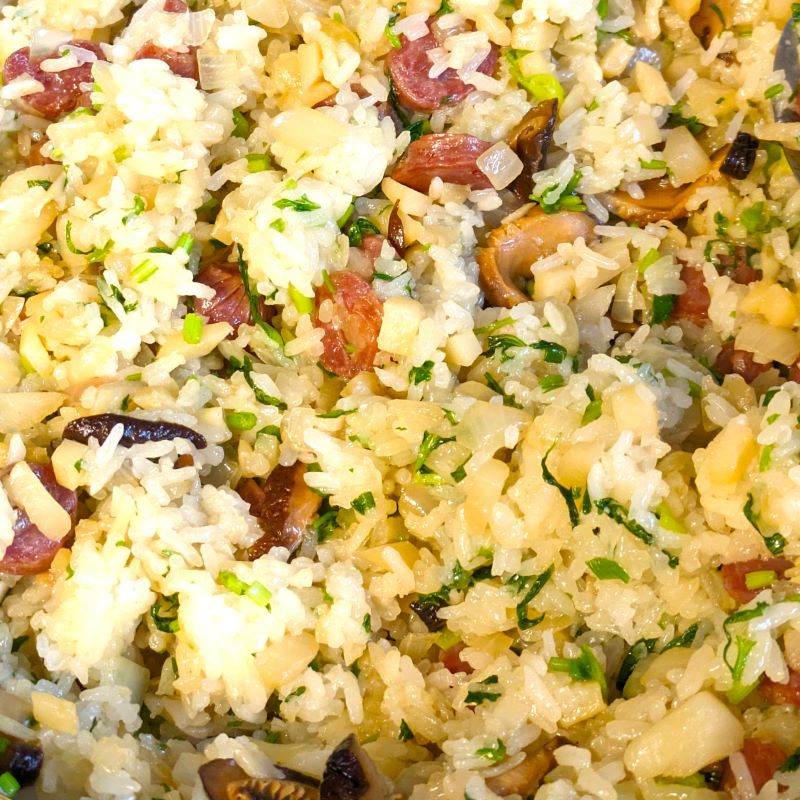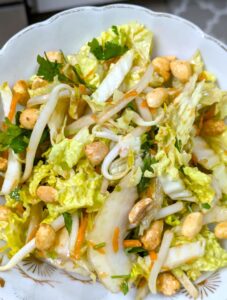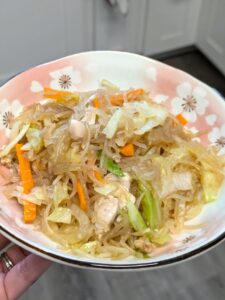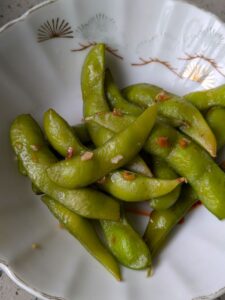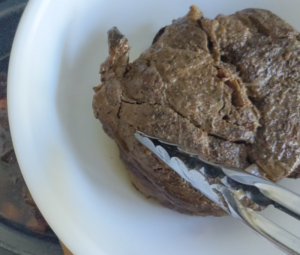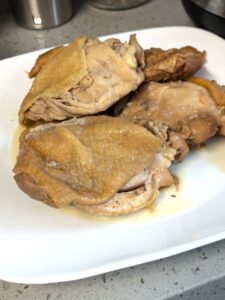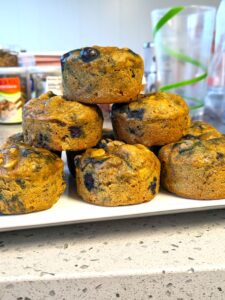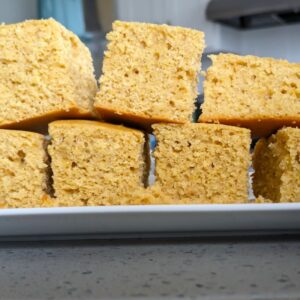This Hawaii-Style Mochi Rice Stuffing makes a delicious chewy, umami-filled bite of food that will awaken any Thanksgiving meal. So many of us are used to bread-based stuffings and dressings and have fond memories of easy-to-make Stove Top stuffing that we learned how to make as kids. However, we also love our rice. My version is adapted from a recipe in The Electric Kitchen’s 20th Anniversary Cookbook published in 2015. It’s put together by the Hawaiian Electric Company and they continue to have great recipes on its website. If you are newer to Hawaii-style cooking, this is a great resource for home cooks with a variety of recipes to try.
This sticky sweet rice mixed in with beautiful aromatic cilantro and green onion and sweet lap cheong (Chinese sausage) will transport you to mornings of eating dim sum on special occasions with your Asian family. Mochi rice stuffing is so good that you will not miss your bread stuffing. In fact, it is probably better for you if you are the type that will eat rice and mashed potatoes with your bread-based stuffing or dressing. You might not load up on the carbs so much. (We can only dream, lol.)
It’s easiest to cook your rice in a rice cooker. We are in love with the Zojirushi Micom Rice Cooker. The 5.5 cup size is just right for our family of 3 that eats rice at least 5 times a week.
What is lap cheong?
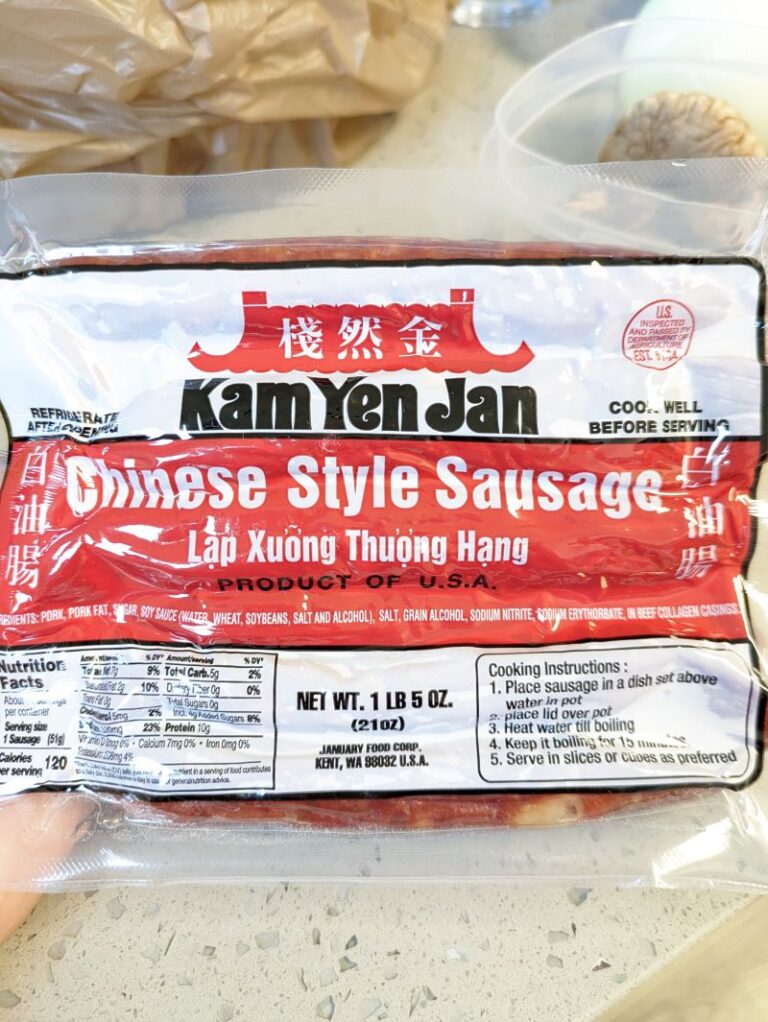
Lap cheong is a Chinese sausage that is dried and cured. It’s usually made with pork and is sweet and salty and is uniquely different from sausages that you normally see in the US. It’s popular in Hawaii because it is shelf-stable for a long time when kept in the original manufacture seal. Once you open the package, you need to keep it in the refrigerator, and it lasts a long time there.
I grew up eating lap cheong that was prepared by being steamed with rice in a rice cooker. Dinner was rice, lap cheong, and whatever vegetable was on sale or was available in the pantry. Steaming lap cheong with rice is a perfect pairing and tastes great with plain rice. After you make this recipe, steam any leftover sausage links by putting it in a rice cooker or on the stove when you cook rice for another fast pantry meal.
Lap Cheong Health Benefits
Lap cheong is not what most people would think of as a healthy food. However, lap cheong is so flavorful and tasty with the fat and sugar added to it that it is a great protein to use in a stir fry. The fat from the sausage renders out so I don’t have to add any olive oil to the pan. Load up the veggies with just a few links of sausage and you can feed a family of 4 a flavorful meal. The hardest part is going to be figuring out what vegetables to cook with it. The key with adding lap cheong into your diet is to use it purposefully and not over do it (as with any other food that has higher fat and/or sugar content).
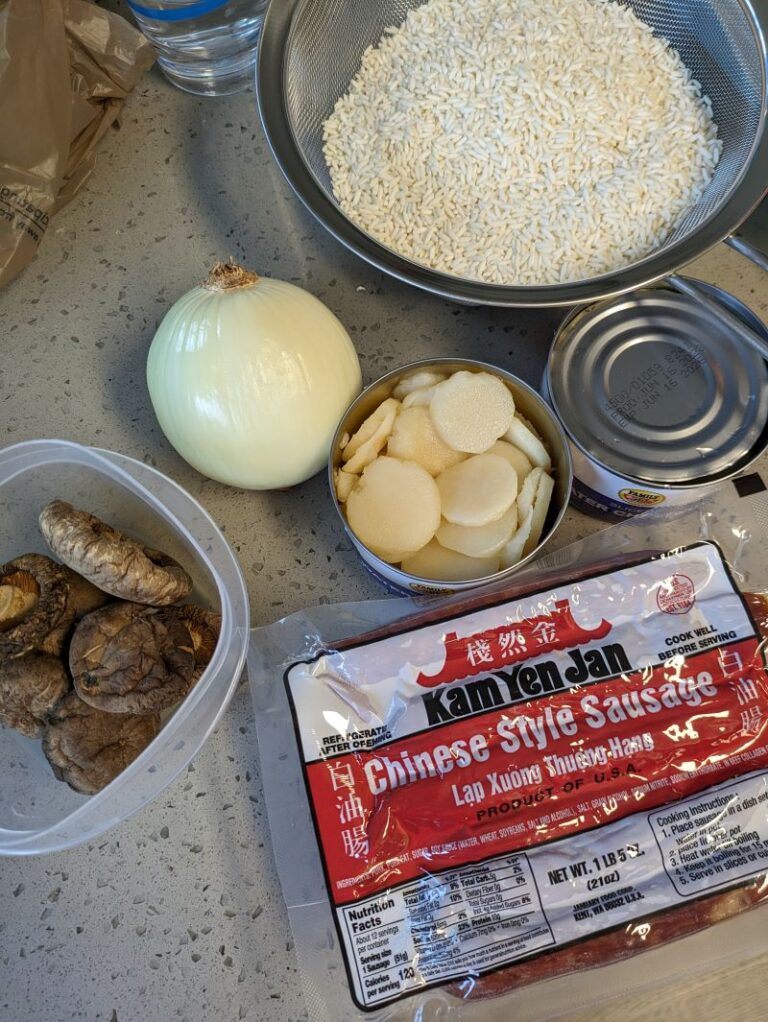
I will get it on sale or at a warehouse store and save it for times when there are unexpected hurdles in the week, and I don’t have time to make a recipe that takes more work or more advanced planning. In addition, we only eat it sparingly. The warehouse store product comes in a two-pack and I will maybe buy lap cheong once or twice a year. This helps our family enjoy the tasty sausage, brings back fond memories of childhood meals, and makes sure we don’t eat too much of it.
Water Chestnuts Health Benefits
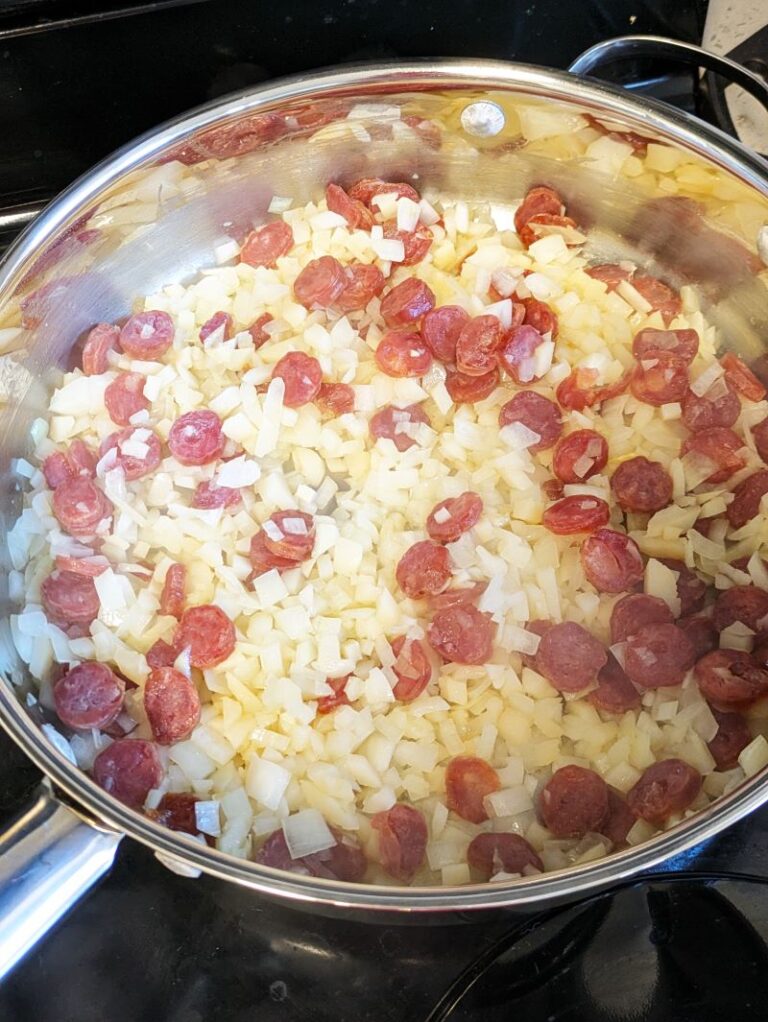
Water chestnuts are very different from the chestnuts you think of in those holiday songs. They are not nuts, but are aquatic vegetables grown in shallow bodies of water. The flesh is white and crispy when you bite into it. Water chestnuts are low in calories and have lots of fiber, making it a great pairing with the lap cheong in helping with digesting this dish later. Don’t forget about the fiber helping to keep you fuller after your meal.
It also has antioxidants and the one in water chestnuts help it to retain its crunchy texture after cooking. These antioxidants may reduce the risk of heart disease and cancer. It’s almost a no-brainer to add these water chestnuts to any dish that needs a crispy texture without deep frying.
Canned water chestnuts are so expensive online. It’s over double the price of what you can find if your local stores have an Asian food section. You’re probably better off looking in small Asian grocery stores and getting a good deal then spending extra money for delivery.
Find more potluck recipes to bring some new flavors to your next holiday gathering below.
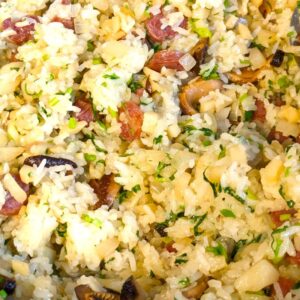
Hawaii-Style Mochi Rice Stuffing
Equipment
- 1 small container with cover (about 2-cup capacity)
- 1 rice cooker or 3-quart or larger pot
- 1 large stainless steel mesh strainer optional
- 1 large cutting board
- 1 chef's knife
- 1 small stainless steel mesh strainer
- 1 11" fryer pan or 5-quart wide pot
Ingredients
- 7 large dried shiitake mushrooms
- 1 cup hot water
- 2 ½ cups mochi rice
- 2 ½ cups water
- 1 large onion chopped (about 1 ½ cups)
- 6 ounces lap cheong (Chinese sausage) chopped (about 4 ½ sausages)
- 2 cans water chestnuts (each can 8 ounces wet, 5 ounces dry) minced
- 2 tsp soy sauce
- 1 tsp salt
- ½ tsp coconut sugar or palm sugar
- ½ bunch cilantro chopped
- ½ bunch green onions chopped
Instructions
- Soak the dried shiitake mushrooms in 1 cup hot water. Let this sit while you prepare the rice and prepare the remaining ingredients, for at least 15 minutes. (If you use cold water, soak for at least 40 minutes, preferably longer up to 2 hours.)
- Rinse the rice until the water starts to run clear (using a large stainless steel mesh strainer is optional). Drain and put in your rice cooker inner pot or a 3-quartpot. Add 2 ½ cups water and soak for at least 15 minutes. When the rice is done soaking, cook in the soaking liquid in rice cooker until done. (If using a pot, bring water to a boil then reduce heat to low, cover, and cook on low for about15 to 20 minutes, stirring occasionally.)
- When you are done preparing the remaining ingredients and started cooking the rice, remove the mushrooms from the soaking liquid, squeeze them to remove excess liquid, and cut off the tough stem. Slice mushrooms into strips. Reserve ½ cup of the soaking liquid; use a strainer to catch any bits of grit or dirt that may have come off the mushrooms.
- Heat large saute pan on medium high heat. Add onions and lap cheong to pan and cook until the onions start to become translucent and some of the fat has rendered out of the sausage, about 5 minutes.
- Add mushrooms, water chestnuts, mushroom soaking liquid, soy sauce, salt, and sugar to the pan. Stir until well combined and cook until the mushrooms are warmed through.
- Add cooked mochi rice, cilantro, and green onions to the pan. If your pan is not big enough to hold all of the rice, mix the rice in a large baking dish or other large bowl (about 5 quarts).
- Serve in place of your favorite stuffing or dressing recipe. If using as a stuffing inside of a turkey or other poultry, make sure the poultry is cooked all the way through as the center of the bird might not cook through with the stuffing inside of it.

